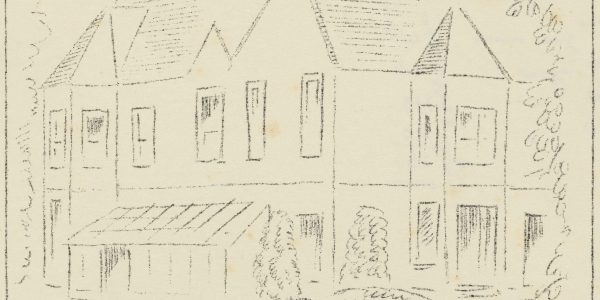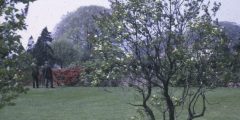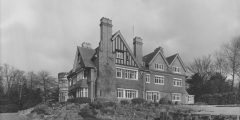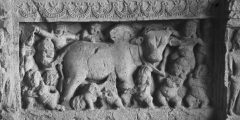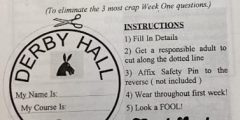House of Many Names: Tracing the Evolution of Paton House
November 17, 2025
Paton House, a late-Victorian brick building featuring a large canopy over the opening, a conservatory adjoining the library and a Baroque interior, was designed in 1881 by Robert Evans and William Jolley, both of whom were Nottingham-based architects who had been trained by Thomas Chambers Hine. The property, which went on to be built in …
Croquet Lawns and Coach Houses: Echoes of Lenton Mount
August 7, 2025
Today known as The Hemsley, the building originally called Lenton Mount is named for its original owner: William Sidney Hemsley. Hemsley was a prosperous lace manufacturer in Nottingham who purchased the plot of land on which his house was built from the Lenton Hall estate in 1904. The property was designed by Nottingham architect William …
Beyond the Sunken Garden: The Many Lives of Lenton Hurst
July 22, 2025
Lenton Hurst is best known for its peaceful formal gardens, but there’s much more to this late Victorian delight: in its long life it has been a home, a college, a student hall of residence and an office, and many of its original features still survive… The land where Lenton Hurst stands today was purchased …
Hugh Stewart Hall: from Marlepitt to Manor House
July 15, 2025
Today, Hugh Stewart Hall is concealed in a wooded hollow, accessible by a winding path leading through an iron pergola covered in climbing plants and past the old tennis courts to the garden, where the story of this remarkable property began. The east side of the garden was once a ‘marlepitt’, according to 16th century …
Outreach Diary
June 26, 2025
Here at MSC, our outreach calendar is always bursting with a wide range of events, visits and classes– here’s just a snapshot of a few highlights from the year so far… First up, we were proud to co-host the module ‘Exploring the German Archive’ alongside the School of Modern Languages and Cultures! Across 10 sessions, …
The Beginnings of University Park
May 22, 2025
Did you know that University Park was originally intended to be a ‘model village’ rather than a university? Prominent industrialist Sir Jesse Boot purchased the Highfields estate in 1919, with the initial idea of transforming it into an attractive self-contained suburb to house Boots employees. However, around the same time, he had been engaging in …
The University of Nottingham Chapel
May 20, 2025
If you mooch around in the depths of the Portland Building you may stumble across Oasis, the Chaplaincy and Faith Support services at the University of Nottingham. There you will find – alongside a multi-faith room, Muslim prayer rooms, and cosy common room – the University’s chapel. Beautifully decorated with elaborate wooden trim, panelled doors, …
Stunning slides saved from skip
March 13, 2025
Here at Manuscripts and Special Collections, we hold many visually striking items, but an intriguing set of over 300 glass slides showing views of India – which depict monuments, landscapes and people – stand out even against this tough competition. The photographs date to approximately the 1860s and 1870s, but unfortunately, we can’t be certain …
Einstein a Go-Go: When Albert Gave a Lecture at University College Nottingham
January 9, 2025
In a teaching room within the Department of Physics and Astronomy at the University of Nottingham hangs a blackboard, protected by a perspex sheet. This blackboard contains theoretical equations written on it by legendary physicist Albert Einstein during a lecture he gave at the University (then University College Nottingham) on 6 June 1930. Using archives, articles …
Extra mirrors and sewing rooms: “the civilising effect of female company upon the male population” in mixed halls of residence
September 5, 2024
Student placement Alice Lilley writes about her work on the Derby Hall archive at Manuscripts and Special Collections and what struck her about how student life has changed since the 1960s. As a volunteer through the Arts Work Placement module, I worked on the Derby Hall Collection for Manuscripts and Special Collections. This was an …

